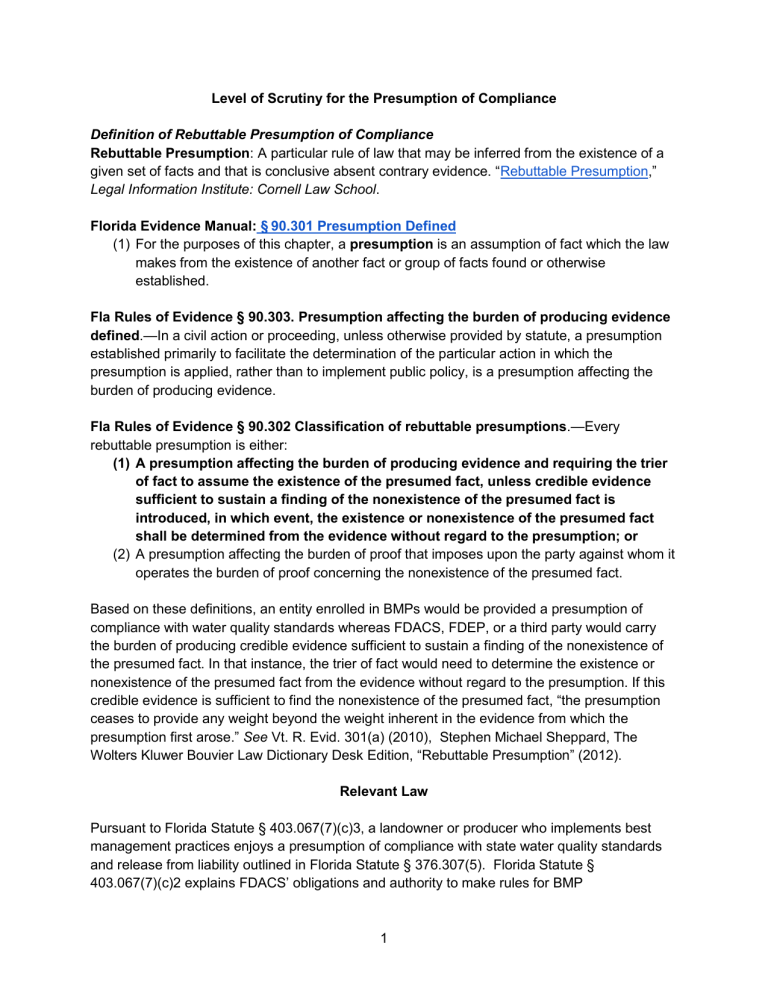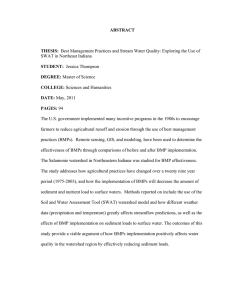
Level of Scrutiny for the Presumption of Compliance Definition of Rebuttable Presumption of Compliance Rebuttable Presumption: A particular rule of law that may be inferred from the existence of a given set of facts and that is conclusive absent contrary evidence. “Rebuttable Presumption,” Legal Information Institute: Cornell Law School. Florida Evidence Manual: § 90.301 Presumption Defined (1) For the purposes of this chapter, a presumption is an assumption of fact which the law makes from the existence of another fact or group of facts found or otherwise established. Fla Rules of Evidence § 90.303. Presumption affecting the burden of producing evidence defined.—In a civil action or proceeding, unless otherwise provided by statute, a presumption established primarily to facilitate the determination of the particular action in which the presumption is applied, rather than to implement public policy, is a presumption affecting the burden of producing evidence. Fla Rules of Evidence § 90.302 Classification of rebuttable presumptions.—Every rebuttable presumption is either: (1) A presumption affecting the burden of producing evidence and requiring the trier of fact to assume the existence of the presumed fact, unless credible evidence sufficient to sustain a finding of the nonexistence of the presumed fact is introduced, in which event, the existence or nonexistence of the presumed fact shall be determined from the evidence without regard to the presumption; or (2) A presumption affecting the burden of proof that imposes upon the party against whom it operates the burden of proof concerning the nonexistence of the presumed fact. Based on these definitions, an entity enrolled in BMPs would be provided a presumption of compliance with water quality standards whereas FDACS, FDEP, or a third party would carry the burden of producing credible evidence sufficient to sustain a finding of the nonexistence of the presumed fact. In that instance, the trier of fact would need to determine the existence or nonexistence of the presumed fact from the evidence without regard to the presumption. If this credible evidence is sufficient to find the nonexistence of the presumed fact, “the presumption ceases to provide any weight beyond the weight inherent in the evidence from which the presumption first arose.” See Vt. R. Evid. 301(a) (2010), Stephen Michael Sheppard, The Wolters Kluwer Bouvier Law Dictionary Desk Edition, “Rebuttable Presumption” (2012). Relevant Law Pursuant to Florida Statute § 403.067(7)(c)3, a landowner or producer who implements best management practices enjoys a presumption of compliance with state water quality standards and release from liability outlined in Florida Statute § 376.307(5). Florida Statute § 403.067(7)(c)2 explains FDACS’ obligations and authority to make rules for BMP 1 implementation. This provision only requires that FDACS include a notice of intent to implement and a “system to assure the implementation of the practices.” Fla. Admin. Code Rules FDACS is given the authority to make rules regarding BMP implementation. Fla. Stat. § 403.067(7)(c)2. Agricultural operations who wish to, or are required to, enroll in Best Management Practices with the Florida Department of Agriculture and Consumer Services (FDACS) must submit a Notice of Intent (NOI) and a BMP Checklist to FDACS which identifies which best management practices that enrollee will implement. This submission enrolls the landowner or manager in the BMP program. While enrolled in the BMP program, a landowner or manager enjoys a presumption of compliance with state water quality standards and release from liability under Florida Statute §376.307(5). FLA. STAT. § 403.067(7)(c)3. 5M-8.003 Presumption of Compliance. Pursuant to Section 403.067(7)(c)3., F.S., implementation of best management practices (BMPs) . . . provides a presumption of compliance with state water quality standards and release from the provisions of Section 376.307(5), F.S., for those pollutants. In order to qualify for a presumption of compliance and release from Section 376.307(5), F.S., the applicant must: (1) Submit the Notice of Intent to Implement: (a) As provided in Rule 5M-8.004, F.A.C., that identifies the applicable BMPs… Implement all applicable BMPs in accordance with the requirements in Rules 5M8.004 or 5M-8.005, F.A.C.; (2) Implement all applicable BMPs no later than 18 months after submittal of the NOI; and, (3) Maintain documentation, in accordance with Rule 5M-8.006, F.A.C., to verify the implementation and maintenance of the identified BMPs. (See 5M-8.006 F.A.C. outlining the requirement for BMP participants to keep records for a period of at least five years . . . to document implementation and maintenance of the practices identified in the manual . . . and in the Notice of Intent to Implement) When does an enrollee’s presumption of compliance begin? Section 403.067(7)(c)3., F.S explains the presumption of compliance with state water quality standards does not begin until the enrollee submits a NOI and BMP checklist to FDACS and implements all applicable BMPs no later than 18 months after submitting their NOI and maintenance of documentation outlined in the BMP manuals for each commodity. FDACS provides instructions on the BMP enrollment process on its website at https://www.fdacs.gov/Agriculture-Industry/Water/Agricultural-Best-Management-Practices: 1. Schedule a meeting with an FDACS representative, who will provide a free FDACS BMP manual and other BMP-related information. 2. Participate with the FDACS representative in a free assessment of your operation to determine the BMPs that apply to your operation. 3. Fill out a BMP checklist and sign the Notice of Intent to implement the BMPs. 4. Keep a copy of the checklist and signed Notice of Intent in your records. 2 5. Implement and maintain the applicable BMPs and keep required records to maintain a presumption of compliance with state water quality standards. F.S. §403.067 states that if all of these requirements are fulfilled, FDEP is then precluded from recovering costs or damages for contamination related to the target pollutants. When does an enrollee lose their presumption of compliance? Based on the above law, when a landowner or manager succeeds in implementing all applicable BMPs and maintaining the required records the landowner/producer receives a presumption of compliance. Further, based on the relevant presumption of compliance evidence rules and FDACS material, an enrollee loses its presumption of compliance the moment that operation fails to implement, or stops implementing, any applicable best management practices checked on his/her BMP checklist. FDACS’ Status of BMP Implementation Report for 2019 explains: “Producers implementing BMPs receive a presumption of compliance with state water quality standards for the pollutants addressed by the BMPs. s..403.067(7)(c)3., F.S. Additionally, producers who enroll in the BMP program become eligible for technical assistance and cost-share funding for BMP implementation.” Fla. Dept. Agric. & Cons. Serv’s, Office of Agricultural Water Policy, Status of Implementation of Agricultural Non-point Source Best Management Practice (2019). This language suggests that only those sites that continually maintain BMPs receive a presumption of compliance. Given that FDACS staff is now required to perform on-site visits to all BMP-enrolled operations every two years and is required to collect and provide to FDEP fertilization and nutrient records from each enrolled producer (SB712 (2020)), BMP enrolledsites’ presumptions of compliance will theoretically be subject to added scrutiny and more sites will potentially lose their presumptions. The new SB 712 rule will provide more opportunity for the entities upon which the burden of presumption acts (FDACS, FDEP and other third parties) to present sufficient evidence to demonstrate the non-existence of the presumed fact or rebut the presumption of compliance with water quality standards. Senate Bill 712, enrolled in 2020 by the Florida Legislature, prescribes in its “Enforcement and verification of basin management action plans and management strategies” section: At least every 2 years, the Department of Agriculture and Consumer Services shall perform onsite inspections of each agricultural producer that enrolls in a best management practice to ensure that such practice is being properly implemented. Such verification must include a collection and review of the best management practice documentation from the previous 2 years required by rules adopted pursuant to subparagraph (c)2., including, but not limited to, nitrogen and phosphorus fertilizer application records, which must be collected and retained pursuant to subparagraphs (c)3., 4., and 6. 3 Moreover, the collection of these records and acknowledgment by staff of ongoing maintenance is the only way for an enrolled site to maintain its presumption of compliance. If a site fails to maintain the required BMPs and recordkeeping, it theoretically should automatically lose its presumption of compliance. However, the presumption may endure until an auditing party challenges the presumption with evidence of the non-existent fact (aka non-compliance with BMP implementation). Does FDACS have the authority to revoke an enrollee’s presumption of compliance? If a landowner/producer chooses not to enroll in the FDACS BMP program and if the producer is found to be violating water quality standards by failing to implement applicable BMPs, FDACS is required to refer that producer to FDEP for water quality monitoring and/or other enforcement action. The FDEP rule that provides guidance on water quality monitoring is Chapter 62-307, Florida Administrative Code. Sections 373.4595 and 403.067, Fla. Stat. Based on the language of Florida Statute § 403.067 and the individual commodity rules, a presumption of compliance only prevents FDEP from recovering costs or damages associated with water contamination from any certified BMP enrollee. However, enrollees that do not implement and maintain the BMPs are violating Florida law and are subject suspension/revocation of the presumption of compliance. Based on the information that FDACS collects on its site visits or through other verification methods, FDACS has the authority to revoke a entity’s presumption of compliance under Section 403.067(7)(c)3., F.S if the records and any relevant data indicates the enrollee is not following the BMP implementation requirements. CONCLUSION A site will otherwise enjoy its presumption of compliance so long as it: 1) implements all applicable BMPs according to its NOI, and meets recordkeeping requirements, and 2) FDACS can verify that the producer has fulfilled its obligations. Once FDACS verifies the producer has maintained all applicable BMPs and kept appropriate records, the site will enjoy an ongoing presumption of compliance until the next FDACS site visit. Furthermore, if FDACS staff records that the site has not implemented all applicable BMPs and has not maintained records, the site likely loses its presumption of compliance until it begins abiding by these guidelines. The question remains how FDACS will store these verification records, what action FDACS takes after finding noncompliance, and whether these verification records will be publicly available. 4


